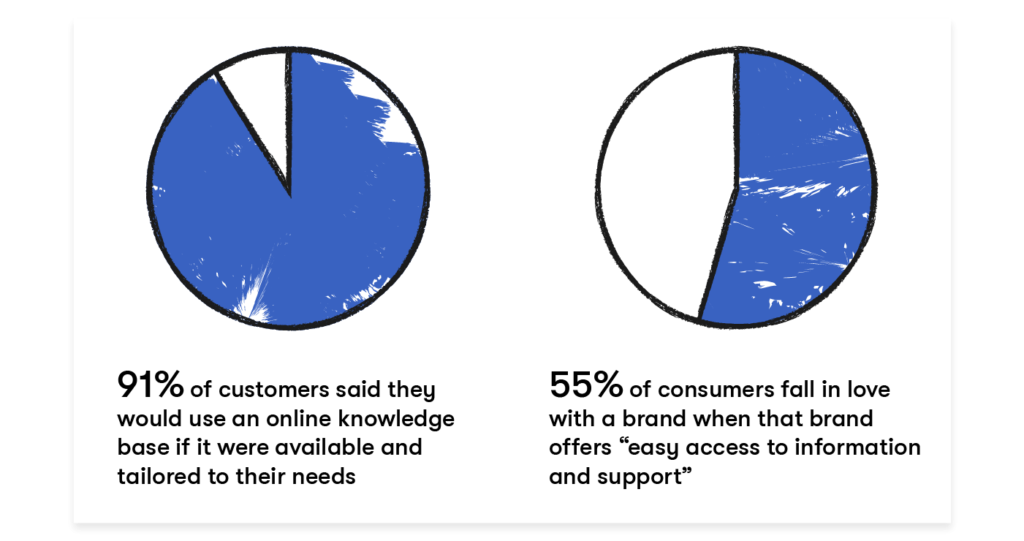6 Ways Content Marketers Can Help Customer Support

Customer support has always been a key priority for organizations. And according to research by American Express, 3 out of 4 customers spend more money on companies that meet their service requirements. After all, every customer expects timely and helpful services from companies.
As more and more services and products adopt remote and digital offerings, countless support tickets get generated. At times, this becomes overwhelming for the support team. To cope with the pressure they need collaboration with marketing, sales, product, and other teams to improve the overall customer experience.
Brands are slowly leveraging content marketing in particular as an effective tool for offering support to their customers. With content marketing tools, resources, FAQs (frequently asked questions), and walk-through videos, content marketing can help customers resolve their issues. This, in turn, reduces the load on customer support teams that can then focus more on critical requests.

If you are contemplating bringing your marketing and support teams together, here are six ways in which you can create stellar customer experiences using content marketing.
Content Marketing Tips to Create Great Customer Experiences
1. Create a resource center or knowledge base
Your support staff usually sifts through a wide range of resources to get the answers customers expect. They have detailed documents to deal with complaints, fix errors or issues, and even raise tickets for a more experienced team if a request goes beyond identified issues. Content marketing can reduce this workload by creating relevant content in a resource center.
An increasing number of brands use micro-sites or resource centers to help customers find answers to their commonly asked questions. In fact, 70% of customers prefer to use a company’s website to get answers to their questions rather than use a phone or email, according to Social Media Today. Creating a resource center helps customers identify solutions to already known problems. This means they no longer need to put in support requests for these common issues. Additionally, a resource center could have searchable content that includes articles and walk-throughs that are easy to navigate.

2. Monitor social channels and chats
Sometimes customers file complaints or put in requests through social media channels. To cater to these requests more effectively, social media and support teams can join hands. While the marketing team can open a line of communication with a customer and help gain additional information, a common portal for addressing grievances can get the job done more quickly.
Recurring requests can also be leveraged by customer support to identify frequent issues or queries. This could include public comments, private messages, and chats.

3. Spot the friction points across your customer marketing journey
While customer support can identify friction points, content marketing, and customer-centric marketing needs to take stock of the situation in a different manner. Basic friction points that often need simple fixes can cause frustration among your customers, and this can lead to negative sentiments and loss of customers. By analyzing the issues raised, marketing teams can spot the friction points along a customer journey.
For example, suppose a particular user group faces issues at the initial stages. In that case, the marketing team could create a welcome video or a walk-through to help customers navigate the product features seamlessly. And videos are a great content marketing tool, considering 68% of people would rather watch a video to solve a problem with a product or service versus reaching out to a customer representative, according to Wyzowl. These content points can be valuable if used effectively.

4. Use insights to create effective content
A Forrester research found that 66% of adults feel that valuing their time is an essential thing a brand can do for them. Exceptional experiences come not just from providing fast and successful resolutions for a particular issue, it also has a lot to do with creating value-driven content. Customers are most likely to search for an answer online before they raise a support ticket, and that’s where content marketing can come in handy.
If the marketing team is involved in overall support functions, it can leverage this information to create focused content pieces like eBooks or blogs. Collaboration between the content and support teams helps a company find new ways to boost brand value.
5. Identify brand advocates and reward interaction.
Not all customers have issues or complaints to report. Sometimes, customers will also say positive things that delight them. An average of 15 people will share a poor service experience with others, while only 11 people will talk about a positive experience with others in their circle. To fill this gap, marketers should make sure that positive experiences get highlighted more.
Good customer experiences can be converted into testimonials, case studies, or other promotional materials that can substantially influence an audience. 84% of customers trust online reviews and testimonials. Marketers can reach out to customers who have had positive experiences and collect their feedback for creating such promotional materials. Moreover, companies can offer special incentives for customers to provide feedback or reviews, encouraging positive experiences to be shared more frequently.
6. Share helpful tips and recommendations through monthly newsletters.
Now that you have awesome content marketing tools like thought-provoking eBooks, how-to articles or FAQ sections for your website, and video walk-throughs, why not make sure that your audience knows about these? Just creating amazing content isn’t enough; you have to make customers aware of it. Newsletters and monthly digests are a great way to start communicating with your customers in this regard.
Sharing client-facing and value-driven materials can make your customers depend on you for help and thought-leadership content. Meanwhile, since your content is beneficial to them, the chances of this material being marked as ‘junk’ or ‘spam’ are low. Just do not email customers too frequently.
Conclusion
To sum it up, content marketing and customer support together can make your customers feel that they are valued. What’s more, a combination of content marketing and customer support can preempt potential roadblocks and ensure you have the resources to deal with a barrage of support requests.
Don’t hesitate to ask for their support as well. The insights of Customer Support are golden when it comes to framing your next content marketing strategy. Your team can hit a slump when it comes to brainstorming new ideas. In such times, invite the CS team to your next meeting for fresh ideation and multiplied creativity.
At the end of the day, it is all about inclusivity. The more involved you are with CS, the better. Remember, it is all about giving the best experience possible to the people who matter. Marketing and customer support can go hand in hand and make the most out of any opportunity.
FAQs
To align marketing with customer support, you need to have a heavily customer-oriented marketing strategy. Here a points to keep in mind:
– Regular feedback: Seek insights and comments from your peers and other departments (especially CS) for setting goals and framing strategies.
– Looping customer support for getting customer feedback: Marketing does not stop after a sale is made. Getting customer feedback from time to time will help in becoming more customer-centric.
– Collaboration: Invite salespeople or other relevant teams of active cooperation on social media. This will humanize your product or service and teach compassion for others. People don’t want to see descriptions; they want stories.
– Monitor impact: After executing a stellar, well-prepared marketing strategy, do not forget to measure its impact. It will be vital for future approaches.
The task of framing customer-driven content may seem riddled with the hassle, but paired with the right content marketing tools, and it can be done quickly and efficiently. Here are some vital tools for delivering the best customer-centric content suitable for customer support:
Uberflip: An AI-powered tool that helps marketers create the best content, suitable for every step of the customer journey.
Mailchimp: An all-in-one email marketing tool that can be used to create an informational newsletter (from its vast template gallery) to measure its impact. This tool is suitable for a firm’s internal and external communication.
Bit.ai: It is a powerful tool for creating e-books. A cloud-based editor that helps document share and tracks an e-book with utmost ease. You must use it if you want to create playbooks for customer support or customers.
Here is a checklist for creating the most resourceful content library for customer support:
– A handy playbook illustrating important company guidelines
– A regular newsletter within the teams
– An editorial calendar
– A set of email templates for customer communications
– Understand the insights: It all comes back to data and its correct interpretation. As mentioned before, looping in your customer support will always help you in devising the most efficient strategy.
– The spectrum of customer success: Never compare your chapter one to someone else’s chapter twenty. Keep the bigger picture in mind and perform accordingly.
– The right people: Everything is better with a supportive team that is aligned well with each other. It is a cliche but for a real reason.
– Tracking the customer journey: Understanding the customer pain points and alleviating those in your customer journey defines customer success. Make sure your moves are aligned to that motive.
– Onboarding experience: Failing to properly onboarding a customer will end up in broken leads. The customer will never buy your product or subscribe to your service. This experience is going to define your foundation.
Latest Blogs
In this blog, explore the golden rules of using AI marketing tools so you can leverage the benefits to their maximum potential.
In this blog, you’ll learn how to avoid the pitfalls of SEO over-optimization while enhancing your site’s performance.
In this article, we’ll take a look at what AMP is, its advantages and disadvantages, and how it affects SEO.
Get your hands on the latest news!
Similar Posts

Content Marketing
8 mins read
The Ultimate Round-Up of Content Marketing Tips from 2023

Content Marketing
6 mins read
Content Marketing in the Age of Big Data: Leveraging Data for Competitive Advantage

Content Marketing
6 mins read